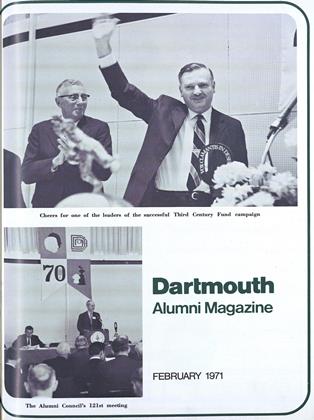EXPERIMENT IN REPUBLICANISM: NEW HAMPSHIRE POLITICS AND THE AMERICAN REVOLUTION, 1741-1794.
FEBRUARY 1971 RICHARD F. UPTON '35EXPERIMENT IN REPUBLICANISM: NEW HAMPSHIRE POLITICS AND THE AMERICAN REVOLUTION, 1741-1794. RICHARD F. UPTON '35 FEBRUARY 1971
By Prof. J ere R. Daniell '55.(History). Harvard Univesity Press,1970. 261 pp. $10.
With the bicentennial of the American Revolution only a few years away, Professor Daniell's work dealing with the politics of the Revolution in New Hampshire is timely. The next five years will probably see a vast output of publications about the Revolution, and I predict that few will attain the quality of the Daniell book.
It covers a broader span of New Hampshire history than the military revolt against Great Britain, takes us back to the administration of Governor Benning Went- worth (1741 to 1767) and thus gives a better perspective of the problems faced by Benning's successor and nephew, John Wentworth, the last royal chief magistrate, serving from 1767 to 1775. The roles played by New Hampshire's colonial agents in London during this period are original and fascinating. An effective "lobbyist" at the Court of St. James's apparently could do much to bolster the administration of a provincial governor in America, and, conversely, when a colonial agent's political influence began to wane, the effect was soon felt locally.
In the last two chapters covering the post-Revolutionary period from 1783 to 1794 we see the Revolution in better perspective, as political leaders put into actual practice the principles of self-government, earlier proclaimed as the justification for their revolt. The reader will be impressed by the openly expressed doubt as to whether representative government could be made to work and by the resort to frank experimentation in "trial and error," before the political leadership finally gained the confidence to settle upon the basic state constitutional system as embodied in the 1791 amendments.
The part played by Dartmouth College in the abortive attempts by the western New Hampshire towns to join the emerging new state of Vermont is related in detail. Aggrieved by lack of representation in the New Hampshire legislature, they had the support of the College administration, so much so that leaders behind the movement to secede were sometimes called the "College Party." Although the secession movement failed, the reputation of the College was damaged. For seven years (until repealed in 1791), the first permanent state constitution (adopted in 1783) contained a clause that "no person holding the office of *** president, professor or instructor of any college, *** shall at the same time have a seat in the senate, or house of representatives or council."
When this reviewer worked in American colonial history at Dartmouth under the late Wayne E. Stevens, the "economic interpretation of history" of Charles A. Beard was widely accepted, but with some notable dissenters, including Professor Stevens. His wise counsel was to "stick to the facts" and not to go overboard on Beard or on any other with a fixed philosophical explanation of history. The tide has now turned, for, as Professor Daniell writes in his preface: "Today no such consensus [relative to the economic interpretation] exists." Historians now pay more attention to the political ideology of the Revolution and to conditions at state and local levels, and so does Professor Daniell. Although Beard has not been wholly rejected, modern research shows that motives of "the pocketbook" were only one of many influences affecting men and events in this period of our history.
Stimulating and original, this book sets high standards of accuracy and scholarship; it "sticks to the facts." The author presents
Mr. Upton is senior partner in the law firmof Upton, Sanders, and Upton of Concord,New Hampshire.
 View Full Issue
View Full Issue
More From This Issue
-
 Feature
FeatureTrustees and Alumni Council Hear 1970 Called "Great Year for Dartmouth"
February 1971 -
 Feature
FeatureThe Blackman Era: Sixteen Special Years
February 1971 By JACK DE GANGE -
 Feature
FeatureAlumni Council Nominates Three for College Trustees
February 1971 -
 Feature
FeatureAlumni Awards
February 1971 -
 Article
ArticleA Different View of Vietnam
February 1971 By STEPHEN HART '68 -
 Article
ArticleFaculty
February 1971 By WILLIAM R. MEYER
RICHARD F. UPTON '35
Books
-
 Books
BooksFaculty Publications
November, 1930 -
 Books
BooksMENTAL HEALTH-PAST, PRESENT, AND FUTURE.
February 1935 By C. J. Campbell '17 -
 Books
BooksKostechev's Plant Respiration. Translated and Edited
DECEMBER 1927 By George M. Robertson -
 Books
BooksTURBULENT ERA. A DIPLOMATIC RECORD OF FORTY YEARS,
February 1953 By HAROLD R. BRUCF. -
 Books
BooksTHE CUBAN FISCAL SYSTEM,
February 1940 By J. M. McDaniel -
 Books
BooksOLD QUOTES AT HOME.
JANUARY 1968 By MAUDE FRENCH




